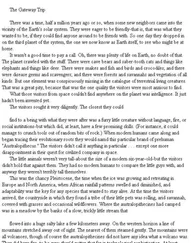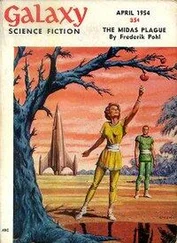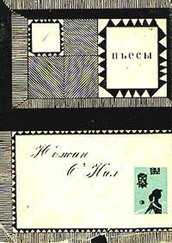Pohl, Frederik - Beyond the Blue Event Horizon
Здесь есть возможность читать онлайн «Pohl, Frederik - Beyond the Blue Event Horizon» весь текст электронной книги совершенно бесплатно (целиком полную версию без сокращений). В некоторых случаях можно слушать аудио, скачать через торрент в формате fb2 и присутствует краткое содержание. Жанр: Старинная литература, на английском языке. Описание произведения, (предисловие) а так же отзывы посетителей доступны на портале библиотеки ЛибКат.
- Название:Beyond the Blue Event Horizon
- Автор:
- Жанр:
- Год:неизвестен
- ISBN:нет данных
- Рейтинг книги:4 / 5. Голосов: 1
-
Избранное:Добавить в избранное
- Отзывы:
-
Ваша оценка:
- 80
- 1
- 2
- 3
- 4
- 5
Beyond the Blue Event Horizon: краткое содержание, описание и аннотация
Предлагаем к чтению аннотацию, описание, краткое содержание или предисловие (зависит от того, что написал сам автор книги «Beyond the Blue Event Horizon»). Если вы не нашли необходимую информацию о книге — напишите в комментариях, мы постараемся отыскать её.
Beyond the Blue Event Horizon — читать онлайн бесплатно полную книгу (весь текст) целиком
Ниже представлен текст книги, разбитый по страницам. Система сохранения места последней прочитанной страницы, позволяет с удобством читать онлайн бесплатно книгу «Beyond the Blue Event Horizon», без необходимости каждый раз заново искать на чём Вы остановились. Поставьте закладку, и сможете в любой момент перейти на страницу, на которой закончили чтение.
Интервал:
Закладка:
“I’m not really sleepy yet. You know what I’d like to do? I’d like to play Trish Bover’s tape again.”
“Oh, God, Lurvy! We’ve all seen it a zillion times!”
“I know, Janine. You don’t have to watch if you don’t want to, but I kept wondering if one of those ships was Trish’s and-Well, I just want to look at it again.”
Janine’s lips thinned, but the genes were strong and her control was as good as her sister’s when she wanted it to be-that was one of the things we were measured on, before they signed us for the mission. “I’ll dial it up,” she said, pushing herself over to Vera’s keyboard. Payter shook his head and retired to his own private, sliding the accordion-pleated barrier into place to shut us out, and the rest of us gathered around the console. Because it was tape we could get visual as well as sound, and in about ten seconds it crackled on and we could see poor, angry Trish Bover talking into the camera and saying the last words anybody would ever hear from her.
Tragedy can only be tragic just so long, and we’d heard it all for three and a half years. Every once in a while we’d play the tape, and look at the scenes she had picked up with her handheld camera. And look at them. And look at them, freeze-frame and blowup, not because we thought we’d get any more information out of them than Gateway Corporation’s people already had, although you never knew. Just because we wanted to reassure ourselves it was all worth it. The real tragedy was that Trish didn’t know what she had found.
“This is Mission Report Oh-Seventy-Four Dee Nineteen,” she began, steadily enough. Her sad, silly face was even trying to smile. “I seem to be in trouble. I came out at a Heechee artifact kind of thing, and I docked, and now I can’t get away. The lander rockets work. But the main board won’t. And I don’t want to stay here till I starve.” Starve! After the boffins went over Trish’s photos they identified what the “artifact” was-the CHON-Food Factory they had been looking for.
But whether it was worth it was still an open question, and Trish surely didn’t think it was worth it. What she thought was that she was going to die there, and for nothing, not even going to cash in her awards for the mission. And then at the end, what she finally did, she tried to make it back in the lander.
She got into the lander and pointed it for the sun, and turned on the motors, and took a pill. Took a lot of pills; all she had. And then she turned the freezer up to max and got in and closed the door behind her. “Defrost me when you find me,” she said, “and remember my award.”
And maybe somebody would. When they found her. If they found her. Which would likely be in about ten thousand years. By the time her faint radio message was heard by anybody, on maybe its five hundredth automatic repetition, it was too late to matter to Trish; she never answered.
Vera finished playing the tape and quietly restowed it as the screen went dark. “If Trish had been a real pilot instead of one of those Gateway go-go prospectors, jump in and push the button and let the ship do its thing,” said Lurvy, not for the first time, “she would have known better. She would have used what little delta-V she had in the lander to kill some angular momentum instead of wasting it by pointing straight in.”
“Thank you, expert rocket pilot,” I said, not for the first time either. “So she could’ve counted on being inside the asteroids a whole lot sooner, right? Maybe in as little as six or seven thousand years.”
Lurvy shrugged. “I’m going to bed,” she said, taking a last squeeze from the bottle. “You, Paul?”
“Aw, give me a break, will you?” Janine cut in. “I wanted Paul to help me go over ignition procedures for the ionthrusters.”
Lurvy’s guard went up at once. “You sure that’s what you want him to go over? Don’t pout, Janine. You know you’ve gone over it plenty already, and anyway it’s Paul’s job.”
“And what if Paul’s out of action?” Janine demanded. “How do we know we won’t hit the crazy time just as we’re doing it?”
Well, nobody could know that, and as a matter of fact I had been forming the opinion that we would. It came in cycles of about a hundred and thirty days, give or take a dozen. We were pushing it close. I said, “Actually, I’m a little tired, Janine. I promise we’ll do it tomorrow.” Or whenever one of the others was awake at the same time-the important thing was not to be alone with Janine. In a ship with the total cubage of a motel room, you’d be surprised how hard that is to arrange. Not hard. Practically impossible.
But I really wasn’t tired, and when Lurvy was tucked alongside me and out of it, her breathing too quiet to be called anything like a snore, but diagnostic of sleep all the same, I stretched against the sheets, wide awake, counting up our blessings. I needed to do that at least once a day. When I could find any to count.
This time I found a good one. Four thousand A.U. plus is a long trip-and that’s as the crow flies. Or, actually, as the photon fires, because of course there aren’t a lot of crows in near-interstellar space. Call it half a trillion kilometers, near enough. And we were spiraling out, which meant most of a revolution around the sun before we got there. Our track wasn’t just 25 light-days, it was more like 60. And, even power-on the whole way, we weren’t coming up to anything like the speed of light. Three and a half years. . . and all the way we were thinking, Jeez, suppose someone figures out the Heechee drive before we get there? It wouldn’t have helped us a bit. It would’ve been a lot more than three and a half years before they got around to doing all the things they wanted to do when that happened. And guess where on that list the job of coming after us would have been?
So the good thing I found to dwell on was that at least we weren’t going to find the trip was for nothing, because we were almost there!
All that remained was to strap the big ionthrusters onto it see if it worked. . . start the slow return trip, shoving the thing back down toward the Earth. . . and, somehow, survive till we got there. Call it, oh, another four years; I went back to cherishing the fact that we were almost there.
The idea of mining comets for food wasn’t new, it went back to Krafft Ehricke in the 1950s anyway, only what he suggested was that people colonize them. It made sense. Bring along a little iron and trace elements-the iron to build a place to live in, the trace elements to turn CHON-chow into quiche lorraine or hamburgers-and you can live indefinitely on the food around you. Because that’s what comets are made of. A little bit of dust, a few rocks, and a hell of a lot of frozen gases. And what are the gases? Oxygen. Nitrogen. Hydrogen. Carbon dioxide. Water. Methane. Ammonia. The same four elements over and over again. CHON. Carbon, hydrogen, oxygen, nitrogen, and what does CHON spell?
Wrong. What comets are made of is the same thing you are made of, and what C-H-O-N spells is “food.”
The Oort cloud was made up of millions of megaton-sized servings of chow. Back on Earth there were ten or twelve billion hungry people looking toward it and licking their lips.
There was still a lot of argument about what comets were doing there, out in the cloud. It was still arguable about whether they even came in families. Opik a hundred years ago said more than half the comets ever sighted fit into well-defined groups, so there, and so did his followers ever since. Whipple said bullshit, there’s not a group you can identify that has more than three comets in it. And so did his followers. Then Oort came along to try to make sense of it. His idea was that there was this great shell of comets all the hell around the solar system, and every once in a while the sun would reach out and pluck one out, and it would come loping in to perihelion. Then we would have Halley’s comet, or the one that was supposed to have been the Star of Bethlehem, or whatever. Then a bunch of the guys began kicking that around, asking why exactly that should happen. It turned out it couldn’t-not if you assume Maxwellian distribution for the Oort cloud. In fact, if you assume normal distribution, you also have to assume that there isn’t any Oort cloud in the first place. You can’t get the observed nearly parabolic orbits out of an Oort cloud; so said R. A. Lyttleton. But then somebody else said, well, who says the distribution can’t be non-Maxwellian? And so it proved. It’s all lumpy. There are clusters of comets, and great volumes of space with almost none.
Читать дальшеИнтервал:
Закладка:
Похожие книги на «Beyond the Blue Event Horizon»
Представляем Вашему вниманию похожие книги на «Beyond the Blue Event Horizon» списком для выбора. Мы отобрали схожую по названию и смыслу литературу в надежде предоставить читателям больше вариантов отыскать новые, интересные, ещё непрочитанные произведения.
Обсуждение, отзывы о книге «Beyond the Blue Event Horizon» и просто собственные мнения читателей. Оставьте ваши комментарии, напишите, что Вы думаете о произведении, его смысле или главных героях. Укажите что конкретно понравилось, а что нет, и почему Вы так считаете.












